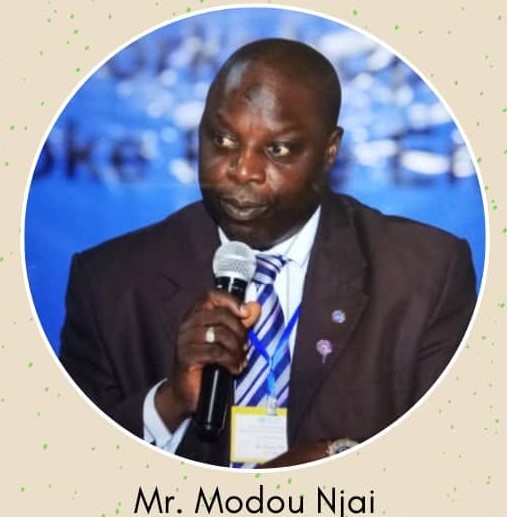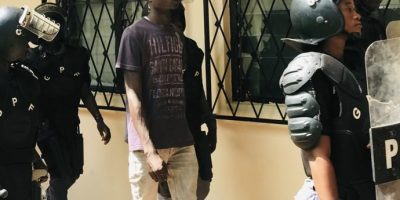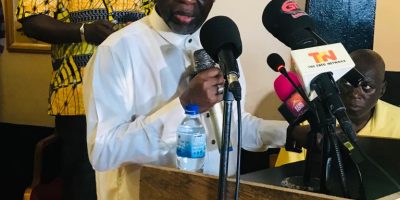
Mr. Modou Njai (Right), Director of Health Promotion, MoH, Gambia
The Director of Health Promotion and Education & Risk Communication and Community Engagement thematic lead of the National Health Emergency Committee on COVID-19 at the Ministry of Health, The Gambia, Mr. Modou Njai, has on 15th September 2020 made a brilliant presentation at a seminar organised by the African Union Commission at the African Academy of Languages (ACALAN) Centre for Linguistic and Historical Studies by Oral Tradition (CELHTO) Webinar on “The Role of African Languages, Oral Tradition and Culture in the Fight against Covid-19.”

As part of the panelists of the international seminar, The Gambia’s Director of Health Promotion Mr Njai’s comprehensive presentation delved extensively into the COVID-19 as well as The Gambia’s stance towards the fight as the pandemic.
His presentation was centered on the Engagement of Traditional and Religious Structures as a Risk Communication and Community Engagement (RCCE) Strategy in COVID-19 Response; in relation to his experience from The Gambia.
Below is a copy of his full presentation:
Engagement of Traditional and Religious Structures as a Risk Communication and
Community Engagement (RCCE) Strategy in COVID-19 Response: Experience from The
Gambia.
Tuesday, 15th September 2020 as Panelist
Presented by: Modou Njai, Director of Health Promotion and Education & Risk Communication
and Community Engagement thematic lead of the National Health Emergency Committee on
COVID-19, Ministry of Health, The Gambia.
Organized by the African Union Commission at the African Academy of Languages (ACALAN)
Centre for Linguistic and Historical Studies by Oral Tradition (CELHTO)
Webinar on “The Role of African Languages, Oral Tradition and Culture in the Fight against Covid-19.”
Preamble
COVID-19 pandemic poses serious threats to public health as well as the economic, social, and
cultural well-being of populations across the world. It has brought global economy to a standstill
and has threatened livelihoods of those affected, their families and the communities at large with
serious disruptions to the social and cultural well-being of the world’s population.
The Gambia registered its first case of COVID-19 on 17 March 2020. So far, as of 19th & 20th
September, 2020 of the 150th National Situation Report on COVID-19, the country has registered
a cumulative total of 3, 540 confirmed cases, 110 deaths and 2,002 recoveries. There is wide
spread local transmission. It is worth noting that prior to the outbreak, the Gambia had adopted
several measures to prepare, and response to the pandemic which includes: 1) strengthening the
surveillance system, particularly at the points of entry, 2) strengthening the capacity of health care
workers to better response to the pandemic, 3) reactivation of the national emergency
preparedness and response committee, 4) development of national COVID-19 preparedness and
response plan and 5) public sensitization and community engagement.
For the purpose of facilitating and coordinating the necessary operational procedures, different
operational arms (sub-committees) have been constituted covering partner coordination, case
management, psychosocial support and research, surveillance and contact tracing, logistics
and supplies and risk communication and community engagement. Notwithstanding the
above, and as it is the case for many public health emergencies, response efforts face many
challenges and difficulties. Key among these are public fear and anxiety, stigma and
discrimination, denials, misinformation and rumours, which often arise as a result of
inadequate, ineffective, and uncoordinated communication and community engagement.
It is therefore critical to communicate to the public what is known about COVID-19, what is
unknown, what is being done, and actions to be taken on a regular basis. Preparedness and
response activities should be conducted in a participatory, community-based way that are
informed and continually optimized according to community feedback to detect and respond to
concerns, rumors and misinformation. Responsive, empathic, transparent and consistent
messaging in local languages through trusted channels of communication, using community based
networks and key influencers and building capacity of local entities, is essential to establish
authority and trust. Hence, the rationale for identifying risk communication and community
engagement as a critical pillar for public health emergencies as articulated in the
International Health Regulations 2005 cannot be over emphasized.
The Risk Communication and Community Engagement (RCCE) Committee is technical
subcommittee to the COVID-19 National Health Emergency Committee act for coordination and
facilitation of planning, implementing, monitoring and evaluation of awareness, community
engagement and behaviour change programme planned and implemented in reference to COVID-
19 emergency response. RCCE is an essential component of a health emergency preparedness and
response action plan against COVID-19 to help to prevent / slow stop transmission of the virus in
communities. This includes communicating effectively with the public, engaging with children,
youth, communities, local partners and other stakeholders to help prepare and protect individuals,
families and the public’s health before and during response to COVID-19 as well as identifying
and managing rumours and misinformation, monitoring and evaluating of awareness, community
engagement and behavioural change programmes.
Overall Objectives
The overall objective of the committee is to provide technical guidance on evidence based
COVID- 19 risk communication and community engagement interventions through a
participatory, community-based approach to inform concerned stakeholders on the best practices,
and to prevent, timely detect and respond to concerns, rumours and misinformation.
Specific Objectives
Develop, organize and guide information dissemination to the general public, affected
communities and responders;
Install and maintain public confidence and trust in public health interventions, institutions
and personnel;
Provide information in a timely and appropriate manner;
Address inaccuracies/rumours to minimize stigmatization, discrimination, fear and panic
among the general public;
Mobilise and engage communities to develop positive attitude and behaviours that prevent
and/or reduces COVID-19 transmission and foster reintegration of survivals in the
community;
Strengthen coordination between national and regional subcommittees on COVID-19
preparedness and response.
Identify trusted community groups (local influencers such as community leaders, religious
leaders, health workers, community volunteers) and local interpersonal communication
networks (women’s groups, youth groups, business groups, traditional healers, etc);
Utilize two-way ‘channels’ for community and public information sharing such as hotlines
(text and talk), responsive social media such as U-Report, television and radio shows, with
systems to detect and rapidly respond to and counter misinformation;
Systematically establish community information and feedback mechanisms including
social media monitoring; community perceptions, knowledge, attitude and practice
surveys; and direct dialogues and consultations; and
Support the preparation of local messages and pre-test through a participatory process,
specifically targeting key stakeholders and at-risk groups.
Composition of membership: The RCCE Committee comprises of competent representatives of
the following organisation/institution
Government Partners
Ministry of Health Gambia Red Cross Society
Ministry of Basic and Secondary Education Association of Health Journalist
Ministry of Information and Communication Network of Community Radios
Ministry of Women and Children, SW UN Agencies
Ministry of Local Government, Lands and Regional
Integration
MRC
Department of Community Development United Purpose
National Youth Council Public Utility Regulatory Authority
Municipalities ( Banjul, Kanifing) GSM providers
National Nutrition Agency Private sector
Strategic approach
The success of implementing Gambia COVID-19 response and other health intervention measures
requires an effective and appropriate strategies. Furthermore, to enhance efficiency, there are set
of procedures and processes that have to be designed and followed for the effective
implementation. One of the most important steps of these is the advocacy, social mobilization
and community outreach awareness campaigns coupled with rigorous community-based
surveillance.
Effective and efficient community participation is by far the most critical approach for curtailing
the spread of COVID-19 in the country. This approach involve Community centered and
community led approach to build on existing community institutions, assets and governance and
decision making platforms which will take cognizance are key community stakeholders such as
Community leaders, Ward Councilors, religious leaders, women and youth groups will take the
responsibility for the response in their communities by developing and operationalizing
Community Action Plans. The community engagement interventions need to build on existing
community structures and resources/assets including, Village Development Committees
(“VDCs”), Ward Committees and others Community Structures and facilitating enabling
environments for dialogue, listening and participation.
In addition, The Gambia is significantly of illiterate community, therefore, there is need for simple
and easy to understand information in the language that people understand sharing focusing on
simple preventive measures like hand washing, use of face masks and physical distancing would
go a long way in achieving short term goals of infection control. It will therefore be prudent to
translate this information into local languages and engage the non-formal education networks to
disseminate and monitor use of this information .Besides most Gambians are religious and hold
their religious and traditional leaders in high esteem. Therefore, meaningful engagement with
opinion or religious leaders is key to raising awareness and ensuring that primary preventive
messages are well received and acted on by the people.
The success of implementing Gambia COVID 19 Response and other health intervention
measures requires an effective and appropriate communication and community engagement
strategies. Furthermore, to enhance efficiency, there are set of procedures and processes that have
to be designed and followed for the effective implementation. One of the most important steps of
these is the advocacy and community outreach sensitization campaigns on COVID-19.
The Directorate of Health Promotion and Education (DHPE) of the Ministry of Health and
partners within the Risk communication and community engagement sub-committee under the
National Health Emergency Committee embarked on a rigorous community engagement
activities geared towards reaching the unreached with correct and consistent COVID-19 messages
in different languages through various communication channels and approaches. The RCCE
approaches at community levels also mobilizes communities to identify cases for prompt
reporting and necessary actions
Progress registered over the period:
I. RCCE committee Terms of Reference (ToR) developed and validated;
II. The committee conducts weekly meetings and recently online meetings are conducted
through ZOOM online platform to plan and coordinate COVID-19 RCCE activities;
III. UN Response plan to the National COVID-19 on RCCE developed from the National
COVID-19 plan highlighting areas where UN agencies will support;
IV. Guideline developed on the Use of Social Media to Manage Information about COVID-
19;
V. A Standard Operating Procedure (SOP) developed for the operationalisation of MoH call
center established and operating 24hrs using the toll free line;
VI. Regional RCCE committees established in all the 7 Health Regions in the country;
VII. Toll free line (1025) secured through PURA from GSM companies where public calls are
process for information sharing, enhancing contact tracing and facilitating COVID-19
response;
VIII. Country specific messages and materials on COVID-19 developed for RCCE
communication interventions.
IX. Toll free line (1025) secured through PURA from GSM companies where public calls are
process for information sharing, enhancing contact tracing and facilitating COVID-19
response;
X. A functional call center established and operating 24hrs using the toll free line;
XI. A dedicated team of 35 MoH staff identified, trained and operating the 24hrs toll free line
on shift duties; and
XII. Country specific messages and materials on COVID-19 developed for RCCE
communication interventions.
XIII. The RCCE Committee engaged the community leaders and family members of the positive
person in Numuyel to accept to be evacuated for quarantine in Basse;
XIV. The RCCE Committee engaged District Authorities, Religious and Opinion leaders, Youth
representative and Village Development Committee Members on the State of Public
Emergency Declaration;
XV. The RCCE Committee engaged regional health authorities on the effective implementation
of the cross-border initiative on COVID-19;
XVI. IOM is currently working with the Regional Health Directorates to engage border
communities in URR, NBRW, CRR, LRR and NBRE on COVID-19;
XVII. Collection and compilation of audiovisual materials on COVID-19 from creative artists
(musicians, actresses, actors and cultural groups);
The Negative Impact of Cultural and Traditional Practices On the Spread of Coronavirus
COVID-19)
in The Gambia
I. The challenge in the fight against COVID-19 is compounded by the rapid spread of myths
and misleading information through social media and other unofficial sources.
II. The Gambia’s cultural, traditional and religious practices allow for a closer interaction at
the household level, ceremonies, “bantaba” chatting (gathering place), religious and
community gatherings, “osusu” (women microfinance platform) or street camps, just to
name a few.
III. These gatherings provide a fertile ground for the spread of COVID-19 and an exponential
increase in our infection rate.
RCCE Strategies used to address challenges: Engagement of traditional communicators or
“Kanyelengs” to disseminate information on COVID-19 in the language understood by the
communities. These messages are disseminated through songs for easy understanding for some
people in the community.
Traditional Communicators or “Kanyelengs”: Who are they?
Tradional communicators in different parts of the country disseminating messages on COVID-19
Tradional Communication
I. Is a form of traditional or folk media;
II. It consist of both drama groups and traditional communicators;
III. They are usually female or male based in a community;
IV. They disseminate health information either through songs or drama in different local
languages for better understanding;
V. They entertain and educate individuals, families and communities in the form of drama or
songs;
VI. They translate health messages into local languages for easy understanding by
communities;
VII. They are well listened to and respected in the community;
VIII. In The Gambian context, traditional communicators or “Kanyelengs” are seen as women
have either no children or lost both children and they are mostly listened in the
communities.
Using music, songs, drumming and dancing to disseminate messages on COVID-19
Music, songs, drumming and dancing can build on local traditions for performing high
entertainment value words can be used for health messages; a good way to help remember
important information, can be performed in a variety of settings and serves as opportunities for
community participation and involvement in health promotion interventions. In addition to music,
songs, drumming and dancing, folk media which is usually in oral form use the spoken word often
based on traditional forms popularly -enjoyed by many people in the community. It also include
entertaining, drama, puppets, storytelling, poetry and proverbs, songs and dance, magic shows and
festivals serves as opportunities for the dissemination of health messages to the population. The
advantages of folk media include the following:
I. Can combine entertainment with education
II. Can explore sensitive issues
III. Provide opportunities for community participation and empowerment
IV. Performance can be done in schools, open markets, streets and community bantabas to
disseminate health messages to the public
Using traditional communication in COVID-19 communication: What has been done!
Community drama groups have been engaged to disseminate information on COVID-19 at
community level in various languages;
Drama scripts developed on COVID-19 prior to the training;
Training on drama skills and COVID-19 message dissemination conducted at community
level;
Drama groups in-turn embarked on outreach community drama performances to reach
many people;
Engagement of traditional communicators to disseminate information on COVID-19 in the
form of songs in various languages for public understanding;
Most of the songs recorded and aired on both TV and radio;
TCs conduct outreach community sensitization on COVID-19;
Village or town criers were engaged to carry out sensitization on COVID-19 in KABILOs
or areas within a given community
District, Ward and Community Mobilization by District Chiefs
The Secretariat of the National Council of Seyfolus is an active member of the RCCE Committee
and facilitate and coordinate the participation of District Chiefs in health interventions across the
country. During the start of the COVID-19 pandemic, the District Chiefs were engaged and they
develop community action plans with the guidance of the RCCE technical team at national,
regional and district levels.
Engagement of district chiefs to carry out step-down orientation of village and household heads
I. The district chiefs are represented by the Secretariat of National Council of Chiefs or
“Seyfolus” in the National RCCE Committee;
II. The district chiefs support the implementation of community bye-laws;
III. They serve as advocates in COVID-19 awareness campaign;
IV. The objectives of this trainings is to:
Inform District Authorities about their stand points in their fight against COVID-19;
Engage district Authorities as advocates in COVID-19 awareness campaign;
Create a platform where community members will be motivated to develop community
action plan for COVID1-9 Prevention and Control;
Intensify community base surveillance especially in border communities.
Actions at District and Community levels on COVID-19
RCCE Team conducting monitoring and supervision of District Chiefs at community level
The 40 District Chiefs at the end of the engagement development community action plans
for implementation;
The 40 District Chiefs engaged embarked on step-down orientation of 1,200 village heads
on COVID-19 across the country of 1,889 communities;
The 40 District Chiefs engaged embarked on participatory and supervision of step-down
orientation of household heads on COVID-19;
Stronger collaboration and partnership exist between the National and sub-National RCCE
Committees on COVID-19;
Engagement of Religious leaders on COVID-19
The Supreme Islamic and Christian Councils are represented in the National RCCE
Committee for the coordination of religious leaders at national, regional and community
levels on COVID-19;
The RCCE Committee at National and Regional levels support the religious leaders to
implement the Action Plans for the sensitization of religious groups and organizations
through sermons in mosques and church services;
The religious leaders actively participate in the implementation of state of public
emergency regulation on COVID-19 response and they use their various platforms to
preach the importance of social/physical distancing and the use of facemasks
Conduct of radio and TV panel discussion with religious leaders on COVID-19
Covid-19: Gambia suspends religious gatherings
Muslim and Christian leaders in The Gambia have agreed to suspend all religious gatherings in
accordance with the ban on public gatherings in the country.
Communication and Community Engagement in Covid 19 context- Gambia experience
RCCE Committee as part of community empowerment for COVID-19 response, engaged
district authorities such as chiefs who in turn conduct step-down orientation for village
heads and village development committees to strengthen community-based on the
development community action plans, strategies and materials;
Engagement and utilization of community Vigilantes to support border surveillance along
the borders of Senegal and The Gambia;
Engagement of Multidisciplinary Facilitation Teams (diverse team from different sectors)
to carry out step-down orientation of village development committees, community
influential leaders in the development and implementation of action plans on COVID-19
response;
Engagement of Red Cross volunteers on COVID-19 which was followed by house-tohouse
sensitization by the volunteers at household level.
Existence of COVID-19 RCCE coordination structures at National, Regional and District
levels with clear Terms of Reference;
Existence of stronger collaboration and partnership with the media on COVID-19
resulting to increased media participation in COVID-19 reporting at central and regional
levels;
Existence of organized women groups, traditional communicators, youth, adolescent and
physically challenged groups actively engaged in COVID-19 RCCE activities;
Comprehensive community engagement plan developed in collaboration with district
authorities for COVID-19 response;
Stronger involvement of creative artists in COVID-19 awareness material production
through songs and drama;
Stronger participation of opinion leaders (legislators, religious leaders, local government
authorities, influential women leaders) in COVID-19 response;
Successful countering of rumors and fake news on COVID-19 through different
platforms, press releases, interviews, etc (communications done in English and Local
Languages for wider public understanding);
Engagement of traditional healers on COVID-19 strengthened collaboration with the
RCCE Committee and Traditional Healers Association (TRAHASS);
Lessons learnt
o Engaging traditional communicators and key influencers can significantly facilitate wider
dissemination of messages at community level;
o The district chiefs, ward councilors and organized women groups can support the
implementation of community action plans;
o Engaging religious, traditional and cultural leaders can use their various platforms to reach
out to the general public on health related issues;
o Community radios can be useful in dissemination of health messages and community
members appreciates to hear the voices of their own people talking to them on various
health and development issues. The power of the radio need to be explored!
Key RCCE challenges
The following are key challenges highlighted and observed during the RCCE joint
assessment of conditions and capacities of communities in the implementation of COVID-
19 prevention and control measures:
⮚ The assessment team noticed that there is increased relapse in the practice of certain
behaviours in some communities especially in the area of avoiding handshaking, avoiding
public gathering, regular handwashing with soap, use of face mask and practice of physical
distancing
⮚ Many households visited are without sufficient hand washing facilities, detergents and
adequate clean water supply resulting to low practice of proper handwashing;
⮚ Many households visited complained of none availability of face mask in their community
making it difficult to access and use face mask in public places;
⮚ Increased stigmatization and discrimination of COVID-19 affected people and their
immediate families;
⮚ Low engagement of various interpersonal communication networks and structures at all
levels on COVID-19;
⮚ Only 110 traditional communicators out of the target of 2500 traditional communicators
across the country have been engaged on COVID-19 message dissemination;
⮚ Lack of funds to pay for the airing of TV and Radio recordings of the songs composed by
the traditional communicators in various languages for easy understanding;
⮚ Low engagement of religious leaders and youth groups on COVID-19;
⮚ No KAP study conducted to determine the level of awareness and behaviours on COVID-
19; and
⮚ Increased public fear and anxiety, stigma and discrimination, denials, misinformation and
rumours, which often arise as a result of inadequate, ineffective, and uncoordinated
communication and community engagement.
Recommendations
I. Countries need to engage cultural, traditional, religious leaders, key influencers, district
chiefs and women leaders on COVID-19 message dissemination;
II. The need for the development and implementation of community action plans on
COVID-19;
III. The need to support the scaling-up of COVID-19 RCCE interventions;
IV. Sustain the gains registered in the area of COVID-19 RCCE interventions;
V. Incorporate African Languages, Oral Tradition and Culture in the fight against COVID-
19; and
VI. The need for the One Year National RCCE Plan to be supported.




Bubacarr Touray
This is scintillating and a true reflection of the director of HPED.